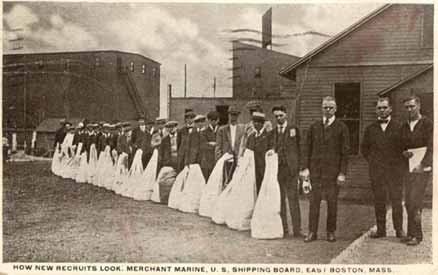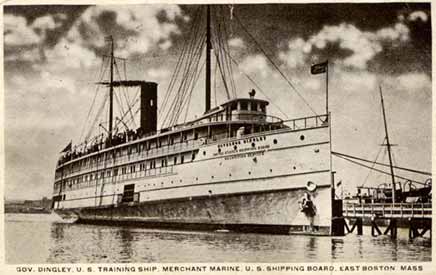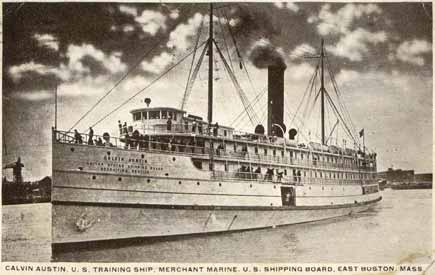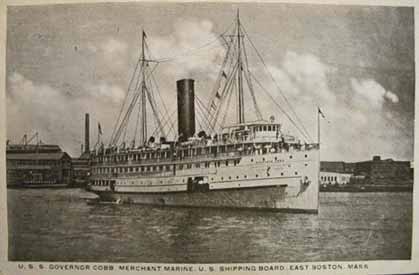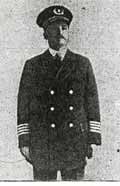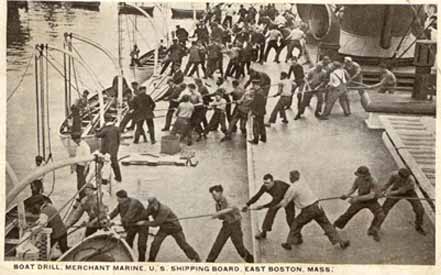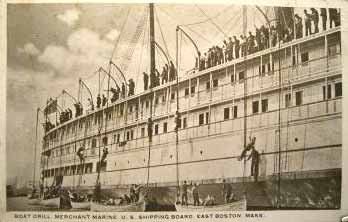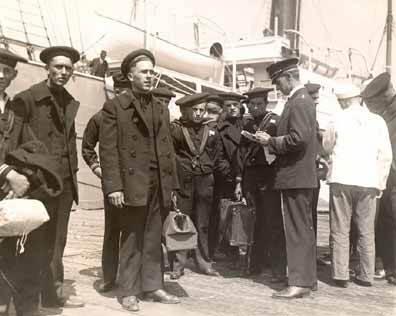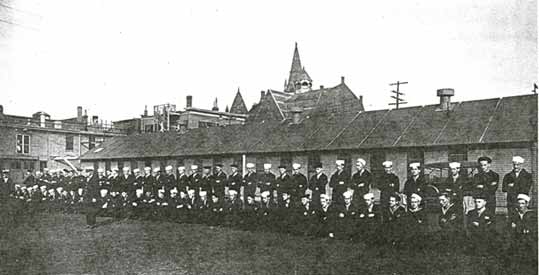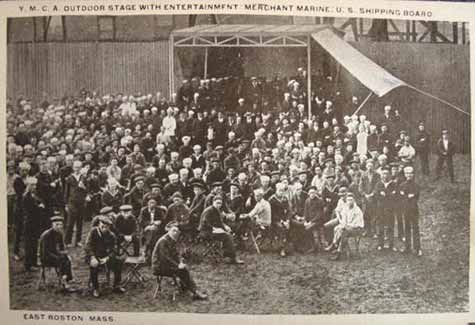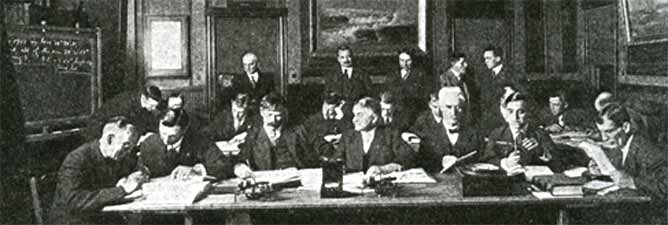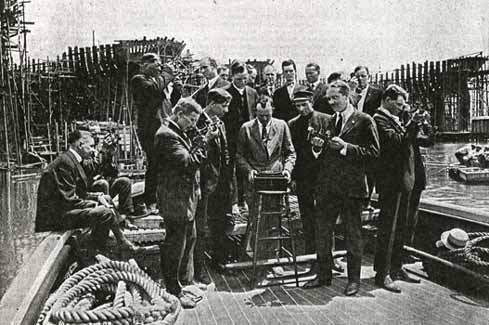World War I Merchant Marine Training for the Sea 1917-1920
The U. S. Shipping Board began its training program in June 1917, with headquarters in Boston, MA. The first school in navigation -- for men with two years sea experience -- opened in Boston, but within months there were 43 schools in seaports from Portland, Maine to Portland Oregon.
The 6-week program trained 1,500 deck officers during the first 10 months. A land-based, 4-week course was offered to train engineering officers. A total of 14,000 men received officer training between June 1917 and October 1920.
The Shipping Board also initiated a program for men with no sea experience to help man new ships. The first to be used as floating schoolships were the Calvin Austin and Governor Dingley, docked in Boston. Other ancient ships were used in other seaports, including the USS Iris, built in 1885, and the USS Meade, the former City of Berlin, which set the transatlantic speed record in 1875. In 1918, 30,000 men were trained on these schoolships as seamen, oilers, firemen, and messmen. Trainees received $30 per month and free uniforms.
The Shipping Board emphasized high wages at sea and set up a recruiting system through the 7,000 stores of the Rexall drugstore chain. Store managers were deputized as agents of the Shipping Board.
New Recruits for Merchant Marine Training in East Boston, MA
Gov. Dingley, U.S. Training Ship, East Boston, MA
Calvin Austin, U.S. Training Ship, East Boston, MA
From left: Gov. Dingley, Calvin Austin, Gov. Cobb, USS Meade.
Training Ship Fleet, East Boston, MA
Gov. Cobb, U.S. Training Ship, East Boston, MA
The officers on the Schoolships wore distinctive uniforms. The picture shows the captain of a training-ship, wearing the standard blue uniform with gold stripes.
Merchant Marine Trainees During Boat Drill, East Boston, MA
Life Boat Drill, Gov. Dingley, East Boston, MA
Where the Boys Eat. Merchant Marine Trainees, East Boston, MA
"The World Before Them. Clean, home-bred boys predomintate among the sailors now being trained for the Merchatn Marine. A group is here shown leaving a Shipping Board training ship for their first deep-water voyage. The Social Service Bureau helps these boys maintain their home ties while following the sea." (original caption)
Graduates of the Atlantic Squadron Base, East Boston, MA
YMCA Provides Entertainment for Merchant Marine Trainees, East Boston, MA
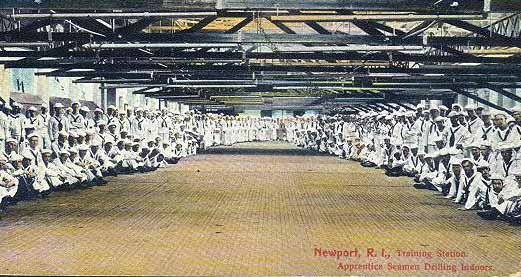
Merchant Marine Trainees at Newport, RI, Training Station
Navigation Class at Gloucester, MA
Students and teachers at the Tampa Navigation School aboard a ship in 1918Navigation Schools
Machias, ME Savannah, GA Rockland, ME Jacksonville, FL Boothbay Harbor, ME Mobile, AL Portland, ME New Orleans, LA Gloucester, MA Galveston, TX Cambridge, MA San Diego, CA New Bedford, MA San Pedro, CA Provincetown, MA Los Angeles, CA Providence, RI San Francisco, CA Greenport, L.I., NY Eureka, CA New York City, NY (2) Portland, OR Atlantic City, NJ Astoria, OR Cape May, NJ Bellingham, WA Philadelphia, PA Tacoma, WA Baltimore, MD Duluth, MN Crisfield, MD Chicago, IL Norfolk, VA Cleveland, OH Newport News, VA Buffalo, NY Wilmington, NC Detroit, MI Charleston, SC
Engineering Schools
Massachusetts Institute of Technology, Cambridge, MA
Stevens Institute of Technology, Hoboken, NJ
U.S. Shipping board Free Engineering School, Bourse Building, Philadelphia, PA
The Johns Hopkins University, Baltimore, MD
The Tulane University of Louisiana, New Orleans, LA
Armour Institute of Technology, Chicago, IL
University of Washington, Seattle, WA
Sources:
Emergency Fleet News, published by the United States Shipping Board Emergency Fleet Corporation, Philadelphia. April 29, 1918; June 10, 1918, July 20, 1918
Personal Collection
Radom, Matthew. "Merchant Marine Training 1917-20," U. S. Naval Institute Proceedings, January 1942Article about Merchant Marine Training Program, 1918
World War I Training Posters
Merchant Marine in World War I
HomeRevised 06/18/2008
www.USMM.org ©1998-2008. You may quote small portions of material on this website as long as you cite American Merchant Marine at War, www.usmm.org as the source. You may not use more than a few paragraphs without permission. If you see substantial portions of any page from this website on the Internet or in published material please notify us.
